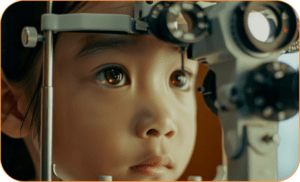Arizona's Vision Eye Care Center
Opening Hours
Mon-Thu: 9:00AM - 6:00PM Friday: 8:00AM- 5:00PM
Our Location
15215 S. 48th Street #180 Phoenix, AZ 85044
Call NOW
Childrens Eye Care Ahwatukee Promotes Healthy Vision
Vision plays a significant role in a child's learning and development journey. Pediatric optometry in Ahwatukee addresses these unique vision needs by providing specialized care.
Regular vision screenings are fundamental to identify potential issues early, which is crucial for effective eye examinations.
Conditions like amblyopia and strabismus can create barriers to learning and social interaction.
Parents are encouraged to consider options such as glasses for kids or contact lenses for children to support their visual health. Encouraging outdoor activities and managing screen time can also promote healthy visual development at home.
Click here to learn more about: our services
Importance Of Pediatric Optometry
Maintaining optimal eye health is essential for children's overall development and well-being. Early identification of childhood vision issues significantly impacts long-term outcomes.
Optometrists in Ahwatukee provide valuable insights to parents regarding the necessity of routine vision screenings.
Monitoring developmental milestones aids in pinpointing the right moments for intervention.
Regular eye exams offer comprehensive assessments tailored to each child's unique needs, ensuring access to the best optometric services. For some children, vision therapy might be recommended to improve visual skills and enhance learning.
Involving parents actively in the process proves beneficial for effective myopia management. Prioritizing these services empowers families to safeguard their children's vision and foster a healthier future.

How To Choose Eye Care Professionals
Making a choice about the right vision care expert is important for your eye health. Pediatric eye specialists play a significant role in monitoring children's eyesight and ensuring their long-term well-being.
Optometrists deliver comprehensive vision assessments and help manage various visual problems.
Ophthalmologists provide surgical interventions and advanced eye care advice tailored to your needs.
Researching their qualifications can inform your decision-making process. Look for specialists who focus on pediatric care, making certain that children receive suitable treatment.
Patient reviews are invaluable as they often reflect the quality of care provided by specific eye professionals. Evaluating the office environment is also essential, particularly for child-friendliness and accessibility.
Inquire about the range of services available, such as myopia management or treatments for astigmatism.
Choosing wisely fosters effective eye safety practices for both you and your family.
Vision Care
- Pediatric eye specialists are essential for early detection of vision problems in children, which can significantly impact their development.
- Optometrists can identify and manage a variety of visual impairments, providing necessary interventions to enhance quality of life.
- Ophthalmologists are trained to perform surgical procedures that can correct serious eye conditions, ensuring comprehensive eye health management.
- Research indicates that patient reviews often correlate with the level of care and satisfaction experienced by clients in eye care practices.
What Is Myopia Management
Effective care for children’s vision plays an essential role in their overall development. Myopia, commonly referred to as nearsightedness, can result in significant complications if not addressed promptly.
Strategies aimed at curbing its progression help protect children's sight and maintain optical health.
Orthokeratology employs specialized lenses that reshape the cornea overnight, enabling clear vision during the day without the need for glasses prescriptions.
Another useful option includes atropine eye drops, which assist in managing myopia growth efficiently. Regular eye tests for toddlers are recommended for identifying early signs of this condition.
Parents should actively monitor their children’s vision to promote optimal visual health while they navigate their growth.
Understanding Visual Development Milestones
Early intervention plays a significant role in supporting children's overall health, particularly regarding their visual capabilities. Monitoring changes in visual acuity assessment patterns provides insights into potential eye issues.
Infants typically start developing eye coordination between 0-3 months, and eye coordination development becomes increasingly refined as they reach 4-6 months of age, allowing them to recognize colors and identify depth.
By the time children are 7-12 months old, their ability to synchronize vision with movement enhances, contributing to their overall developmental progress.
Parents should remain vigilant for indications of visual difficulties, such as squinting or persistent difficulty focusing. Regular vision screenings pave the way for long-term educational success and support informed decisions about children's eyewear options when needed.
Introducing UV protection eyewear can safeguard developing eyes from harmful rays.
Early Intervention and Visual Health
- Infants develop eye coordination skills between 0-3 months, which is crucial for visual development.
- By 4-6 months, infants can recognize colors and identify depth, indicating refined eye coordination.
- Children aged 7-12 months enhance their ability to synchronize vision with movement, aiding overall development.
- Regular vision screenings help identify potential issues early and support informed decisions regarding eyewear.
Eye Examinations For Children: What To Expect
Routine assessments of vision play a significant role in maintaining children's overall well-being. Pediatric ophthalmologist visits are important, as they can reveal potential refractive errors that might go unnoticed.
Parents should prioritize scheduling these assessments without delay.
During the appointment, professionals will inquire about family vision histories and any observable symptoms that the child experiences.
Recognizing digital eye strain signs is important for children’s visual comfort. Various types of eye evaluations, such as screenings and comprehensive tests, address different needs effectively.
After the evaluation, interpreting results may provide insights for future treatments and referrals, ensuring children receive appropriate eye care education resources.
Effective Eye Care Advice For Parents
Ensuring your child's vision is a top priority for every caregiver. Regular vision screenings play a significant role in maintaining healthy eyesight.
Comprehensive exams conducted by professionals are essential for identifying potential issues early.
Parents should closely monitor for signs of vision problems, including squinting or difficulty reading.
Awareness of these behaviors helps in seeking timely assistance.
Tracking visual development milestones allows families to monitor their child's progress effectively.
Eye care items like adequate lighting and ergonomic setups for reading can greatly support eye health.
Consult with an optometrist in Ahwatukee for insights on lazy eye interventions, which may include the use of eye patches for therapy.
Child Vision Care
- Regular vision screenings can detect issues before they become significant problems.
- Children may not always express their vision difficulties, making parental observation crucial.
- Visual development milestones vary by age, and tracking them helps ensure proper eye health.
- Interventions for lazy eye, such as eye patches, can be effective when started early.
Exploring Childrens Eyewear Options
Selecting proper eyewear is essential for supporting children's overall vision enhancement. Fitting glasses should consider their unique lifestyles and developmental stages.
Parents must recognize the importance of comfortable frames that encourage consistent usage.
Fashionable options are plentiful, providing kids an opportunity to showcase their personality while fulfilling their vision correction methods.
Durable materials like polycarbonate lenses ensure safety during active playtimes. Pediatric eye health programs highlight the necessity of routine eye exams, which can help detect issues early and facilitate appropriate solutions.
Eye care clinics in Ahwatukee offer valuable guidance for parents interested in making well-informed decisions regarding their children's eyewear.
How To Manage Eye Allergies In Kids
For parents, prioritizing the well-being of children with allergies is essential. Children's visual assessments can help establish the right approach to managing these conditions.
Recognizing common allergens, including pollen and pet dander, allows for better symptom management.
Keeping living spaces clean by vacuuming regularly can significantly minimize exposure to eye irritants.
Setting appropriate screen time limits for kids can also improve their comfort, as prolonged screen exposure may exacerbate existing symptoms.
Consulting with knowledgeable eye care professionals provides access to effective treatment options like antihistamines or specialized eye drops.
Comfort and style in eyeglass frames for kids play a role in encouraging consistent wear when necessary.
Children's Allergy Management
- Regular visual assessments can lead to tailored management strategies for children with allergies.
- Common allergens such as pollen and pet dander are linked to increased allergy symptoms in children.
- Maintaining a clean living environment through regular vacuuming reduces exposure to allergens and eye irritants.
- Consulting with eye care professionals can provide children with suitable treatments, enhancing their comfort and quality of life.

Dr. Page is a licensed Doctor of Optometry, and a long time resident of Ahwatukee Arizona. He graduated from the New England College of Optometry in Boston in 1990. He moved to Phoenix to serve the community in both his clinic and by becoming a community activist.
He is deeply involved in supporting the local athletic teams, the arts, pet adoption and children. He is a charter member of the Chamber of Commerce.
After watching his father lose vision in his right eye he dedicated his career to finding a way to stopping eyes from getting worse. He is the founder of the Invisalens eye retainer and a best selling author for his book: Freedom! The Smart Parents Guide to Helping Your Child See a Better Life.
He specializes in helping his patients see better with eyeglasses, contact lenses, nutrition and genetics.
Words can't describe what our eyes bring to life!